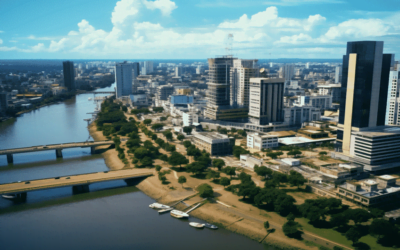Hey there, fellow drone enthusiast! If you’ve landed here, you’re probably as curious and passionate about flying drones as I am. And just like you, I’ve often found myself searching for reliable information on Ethiopia’s drone laws.
The thing is, drone regulations can be a bit complex and ever-evolving. But fear not, my friend, because I’ve done my homework, and I’ve got the answers you’re seeking.
In my quest for clarity on Ethiopia’s drone laws, I’ve delved deep into the regulations, scoured official sources, and even consulted with local experts. So, you can trust that the information I’m about to share isn’t just a random collection of facts.
It’s the result of thorough research, and I’m here to break it down for you in a way that’s easy to grasp.
So, if you’re wondering how to legally fly your drone in Ethiopia, which licenses are required, or what rules apply to hobbyists, commercial operators, tourists, and even government agencies, you’re in the right place.
I’ve got the lowdown on all of it, and I’m ready to share the insights with you. Dive into this article, and you’ll discover the key details about Ethiopia’s drone laws, allowing you to navigate the skies with confidence. Let’s get started!
Overview of Drone Regulations in Ethiopia

You know, one of the most exciting aspects of the drone world is that it’s always in motion, much like the drones themselves. When it comes to Ethiopia’s drone regulations, there’s a dynamic landscape that’s continually evolving. So, let’s set the stage for what you need to know.
Drone Regulations in Ethiopia
Ethiopia did have some regulations in place for drone operations, but the specifics were a bit hazy. Here’s the deal: you can fly drones in Ethiopia, but it’s not a free-for-all.
There are rules in place, and these rules tend to apply differently based on whether you’re a hobbyist, a commercial operator, a tourist, or even a government agency.
Now, those rules typically touch on important aspects like registration and licensing, but they may not be as detailed as regulations in some other countries. That’s why, if you’re planning to take flight in Ethiopia, it’s crucial to do your homework and familiarize yourself with the latest updates from local authorities.
These guidelines might be subject to change, and the last thing you want is to be caught unaware when soaring the Ethiopian skies.
Regulations May Change Over Time
Remember, the drone world is a bit like a moving target. What’s legal today might not be the same next year. So, here’s my friendly advice: always keep your ear to the ground. Stay updated with the Ethiopian Civil Aviation Authority (ECAA) or any relevant local authority.
Regulations have a habit of shifting to keep pace with the drone industry’s growth. With these guidelines, my aim is to give you a solid starting point, but the responsibility to ensure compliance with the most current regulations rests on your shoulders. Ready to explore more? Let’s dig deeper into Ethiopia’s drone laws!
Also Read: Estonia Drone Laws 2024
Drone Laws for Hobbyists in Ethiopia

Let’s kick things off by exploring the world of hobbyist drone enthusiasts in Ethiopia. If you’re a drone lover like me and you’re thinking of flying your bird just for fun, this section is for you. Here, I’m going to lay out the rules and guidelines that you need to keep in mind for your recreational drone adventures.
Regulations for Individuals Flying Drones for Recreational Purposes
For those who fly drones as a hobby, good news – it’s permitted in Ethiopia! The country allows hobbyist drone flights, and that means you can take to the skies to capture those stunning aerial views, whether you’re just honing your piloting skills or looking to enjoy the sheer thrill of flying.
Hobbyist Drone Flights are Allowed
Yes, you read that right. Hobbyist drone flights are indeed allowed. Ethiopia recognizes the joy and creative potential that drones bring to enthusiasts. You can explore the scenic beauty of this fascinating country through your drone’s lens, as long as you adhere to the regulations in place.
Hobbyist Ethiopia Drone Pilot License Requirement
Now, here’s where it gets a bit more serious. If you’re flying your drone for fun in Ethiopia, you’re required to obtain a hobbyist drone pilot license. It’s a way to ensure that you’re aware of the safety rules and regulations, helping you fly responsibly and protect both your drone and the people around you.
Drone Registration Requirement for Hobbyists
As a hobbyist, you’ll also need to register your drone. This is a common requirement in many countries, and it helps authorities keep track of drone owners and their devices. Don’t worry; the registration process is usually straightforward and ensures accountability.
Drone Remote ID for Hobbyists
One thing to note is that, as a hobbyist, you aren’t required to have a Drone Remote Identification (Remote ID) system installed on your drone. This means you won’t need to broadcast identifying information while flying, as is often the case for commercial operators.
Recommendation for Hobbyists to Have Drone Insurance
While it’s not a strict requirement, it’s strongly recommended that hobbyists consider drone insurance. Accidents can happen, and having insurance can provide peace of mind in case of any mishaps during your recreational flights. It’s a small investment for added security while enjoying the world from above.
So, hobbyists, you have the green light to fly your drones in Ethiopia, but remember to get that pilot’s license and register your drone. It’s all about keeping the skies safe while you explore the incredible landscapes and scenes this country has to offer. Ready for more insights? Let’s keep unraveling Ethiopia’s drone laws.
Also Read: Estonia Drone Law
Drone Laws for Commercial Operators in Ethiopia

Now, let’s venture into the exciting realm of commercial drone operations in Ethiopia. If you’re looking to use drones as part of your business endeavors, this section is where you’ll find the insights you need to navigate the regulatory landscape.
Businesses Using Drones for Commercial Purposes
Commercial drone operators play a vital role in various industries, from agriculture to aerial photography.
However, with great opportunity comes the need for regulations. In Ethiopia, there are specific rules in place for those looking to leverage drones for commercial purposes, ensuring safe and responsible operations.
Commercial Drone Flights are Allowed
Yes, Ethiopia allows commercial drone flights. This means that if your business activities involve the use of drones, you have the opportunity to harness the power of aerial technology to enhance your operations. It’s a significant step forward for innovation and efficiency.
Ethiopia Drone Pilot License Requirement
If you’re planning to use drones for commercial operations, you’ll need to obtain a commercial drone pilot license.
This license demonstrates your knowledge of the regulations and safety procedures required for business-related drone flights. It’s a way to ensure that commercial operators are well-prepared for their responsibilities.
Drone Registration Requirement for Commercial Drone Operators
Just like hobbyists, commercial drone operators are required to register their drones. This registration process is essential for monitoring and accountability, allowing authorities to keep track of the drones used for business purposes.
Drone Remote ID for Commercial Drone Operators
Commercial operators in Ethiopia are not mandated to have a Drone Remote Identification (Remote ID) system on their drones.
This means you won’t need to broadcast identifying information while operating your drones for business purposes.
Drone Insurance for Commercial Operations (Mention the Recommendation)
While there’s no strict requirement for mandatory drone insurance, it’s highly recommended for commercial operators.
The nature of business operations often involves higher risks, and having insurance can provide financial protection in case of accidents or mishaps during your commercial drone activities. It’s a safety net that many businesses find invaluable.
So, for all you entrepreneurs and businesses out there, Ethiopia opens its skies to your commercial drone ventures. Just remember to get that commercial drone pilot license and register your drones.
While insurance isn’t obligatory, it’s a smart move to consider for added security and peace of mind. Ready to delve deeper into Ethiopia’s drone laws? Let’s continue our exploration.
Drone Laws for Foreign Visitors/Tourists in Ethiopia
As an avid traveler or a foreign visitor to Ethiopia, you might be eager to capture the stunning landscapes and vibrant cultures with your drone. In this section, we’ll explore what you need to know about flying drones in Ethiopia as a tourist or foreign visitor.
Regulations for Tourists or Foreign Visitors Using Drones in Ethiopia
Flying a drone as a tourist or foreign visitor can add a new dimension to your travel experience. However, it’s crucial to be aware of the regulations that govern drone usage during your stay in Ethiopia to ensure that your aerial adventures are both safe and legal.
Foreign Visitor Drone Flights are Allowed
The good news is that Ethiopia does allow foreign visitor drone flights. This means you can bring your drone along and capture those memorable moments from the sky, whether you’re exploring the historic cities or the country’s breathtaking natural wonders.
Requirement for Foreign Visitors to Obtain a Drone Pilot License
One important aspect to note is that foreign visitors are required to obtain a drone pilot license. This license helps ensure that you’re familiar with the local regulations, even if you’re only planning to fly your drone during your visit. It’s a step toward responsible drone operation while in Ethiopia.
Drone Registration Requirement for Tourists
Just like local drone enthusiasts, tourists are also required to register their drones in Ethiopia. The registration process is typically straightforward and is designed to help authorities keep track of drones in use within the country.
Drone Remote ID for Tourists
As a tourist or foreign visitor, you won’t be required to have a Drone Remote Identification (Remote ID) system installed on your drone. This means you won’t need to broadcast identifying information while flying for personal use during your visit.
Drone Insurance for Tourists’ Drone Operations
While drone insurance isn’t mandatory, it’s a wise consideration for tourists. Traveling with a drone can be an exciting adventure, but accidents can happen. Having insurance can offer a safety net and peace of mind, especially when you’re in a foreign country.
For tourists and foreign visitors, Ethiopia welcomes your drone adventures, but be sure to obtain that drone pilot license, register your drone, and consider drone insurance for added security.
These measures will help ensure that your drone experiences enhance your journey and remain within the bounds of local regulations. Ready to discover more about Ethiopia’s drone laws? Let’s keep exploring.
Also Read: Eritrea Drone Law 2024
Drone Laws for Government Operators in Ethiopia

The use of drones by government agencies is becoming increasingly common, serving various purposes such as surveillance, emergency response, and infrastructure assessment. In this section, we’ll delve into the regulations that apply to government operators in Ethiopia.
Regulations Concerning Government Drone Operations in Ethiopia
Government drone operations in Ethiopia are subject to specific regulations designed to ensure responsible and safe use. These regulations help government agencies carry out various tasks while maintaining the integrity and safety of national airspace.
Government Drone Flights are Allowed
Ethiopia allows government drone flights, recognizing the importance of drone technology in modern governance. Government agencies have the green light to leverage drones for public service and safety.
Government Ethiopia Drone Pilot License Requirement
For government drone operations, there’s a requirement for a government-issued drone pilot license. This ensures that government personnel are well-versed in the rules and regulations that apply to drone operation, contributing to responsible and effective drone use in various government functions.
Drone Registration Requirement for Government Operations
Just like other drone operators, government agencies are required to register their drones. Registration allows for transparency and accountability, ensuring that government-operated drones are monitored and adhere to national regulations.
Drone Remote ID for Government Operations
Government-operated drones in Ethiopia are not mandated to have a Drone Remote Identification (Remote ID) system installed. This exempts government agencies from the requirement to broadcast identifying information while carrying out their drone missions.
Drone Insurance for Government Drone Operations
While there’s no strict obligation for government agencies to have drone insurance, it’s typically assessed on a case-by-case basis. Government operations often have unique insurance arrangements based on the specific activities and potential risks involved.
For government operators in Ethiopia, the use of drones plays a pivotal role in enhancing public service and safety. Compliance with drone pilot licensing and registration requirements ensures that government drones are used responsibly.
Although there’s no strict requirement for drone insurance, its consideration can be essential based on the nature of government activities. Ready to uncover more about Ethiopia’s drone laws? Let’s continue our journey.
Also Read: Equatorial Guinea Drone Law 2024
Potential Penalties and Consequences

We’ve delved into the exciting world of drone regulations in Ethiopia, exploring the skies for hobbyists, commercial operators, tourists, and government agencies. But what happens when the rules are bent or broken? Let’s talk about the potential penalties and consequences.
Drone Laws in Consequences
It’s crucial to understand that, like any set of laws, drone regulations come with teeth. Violations can lead to penalties and consequences that may range from fines to more severe actions, depending on the nature of the offense and its impact.
Potential Penalties, Fines, or Legal Actions for Non-Compliance
The consequences of violating drone laws in Ethiopia can vary. Common penalties may include fines, which can range from moderate to substantial, depending on the severity of the violation.
More serious offenses, such as flying drones in restricted or prohibited areas, can lead to legal actions, including confiscation of equipment, and in some cases, imprisonment.
It’s essential to be aware that violating drone laws not only carries the risk of legal consequences but can also harm the overall reputation of drone enthusiasts, especially in cases where drones are flown irresponsibly or in sensitive areas.
Remember, the goal of these regulations is to ensure safety, privacy, and the responsible use of drone technology.
So, while it’s exciting to explore the world from the sky with your drone, it’s equally important to do so within the boundaries of the law.
Understanding the potential penalties and consequences should serve as a reminder to all drone operators to fly with responsibility and respect for the regulations in place. Ready to dive even deeper into the fascinating world of Ethiopia’s drone laws? Let’s continue our journey.
Also Read:El Salvador Drone Law 2024
Final Thoughts on Ethiopia Drone Laws

As we come to the end of our journey through Ethiopia’s drone laws, I hope you’ve gained valuable insights into the world of drone operation in this captivating country.
Whether you’re a hobbyist, a commercial operator, a tourist, or a government agency, Ethiopia offers opportunities to explore its skies and landscapes from above.
The key takeaway is the vital importance of adhering to the regulations. These rules are not meant to stifle your drone adventures but rather to ensure that they’re carried out safely and responsibly.
By respecting these regulations, you contribute to the positive image of drone enthusiasts and safeguard the privacy and well-being of others.
One thing to remember is that the drone world is dynamic, and regulations can change. So, whether you’re planning a new drone adventure in Ethiopia or you’re a seasoned pilot, it’s essential to stay updated with the latest regulations.
Verify any recent changes with local authorities, such as the Ethiopian Civil Aviation Authority, to ensure that your drone activities remain compliant with the most current rules.
In the end, the skies are open for exploration and adventure, and Ethiopia’s drone laws are there to help us enjoy these experiences safely and responsibly. So, as you prepare for your next flight, remember to fly with knowledge, respect for the law, and a sense of wonder.
Happy flying, and may your drone journeys be filled with unforgettable moments and breathtaking sights.
Frequently Asked Questions on Ethiopia Drone Laws
1. Are drone flights allowed for hobbyists in Ethiopia?
Yes, drone flights are allowed for hobbyists in Ethiopia. The country permits recreational drone operations. However, hobbyists are required to obtain a hobbyist drone pilot license and register their drones. While there’s no mandatory requirement for Drone Remote Identification (Remote ID) or drone insurance, it’s strongly recommended to consider insurance for added security during your flights.
2. Can commercial operators fly drones in Ethiopia?
Certainly, Ethiopia allows commercial drone flights. If you plan to use drones for business purposes, you’ll need to obtain a commercial drone pilot license and register your drones. While there’s no strict requirement for drone insurance, it’s advisable for commercial operators to consider insurance to mitigate potential risks.
3. What about foreign visitors and tourists? Can they fly drones in Ethiopia?
Yes, foreign visitors and tourists can also enjoy drone flights in Ethiopia. They are allowed to fly drones, but they need to obtain a drone pilot license, register their drones, and consider drone insurance for added security. Like hobbyists and commercial operators, there’s no mandatory requirement for a Drone Remote ID.
4. Are government agencies allowed to use drones in Ethiopia?
Ethiopia permits government drone flights, recognizing their importance in public service and safety. Government agencies are required to obtain a government-issued drone pilot license and register their drones. While there’s no mandatory requirement for drone insurance, government agencies often have unique insurance arrangements based on specific activities.
5. What are the potential penalties for violating Ethiopia’s drone laws?
Violations of drone laws in Ethiopia can result in various penalties, including fines and legal actions. The severity of penalties can vary based on the nature and impact of the violation. More serious offenses, such as flying in restricted areas, can lead to legal actions, including equipment confiscation and imprisonment. It’s essential to be aware of the potential consequences and to prioritize safe and responsible drone operations to avoid such penalties.













